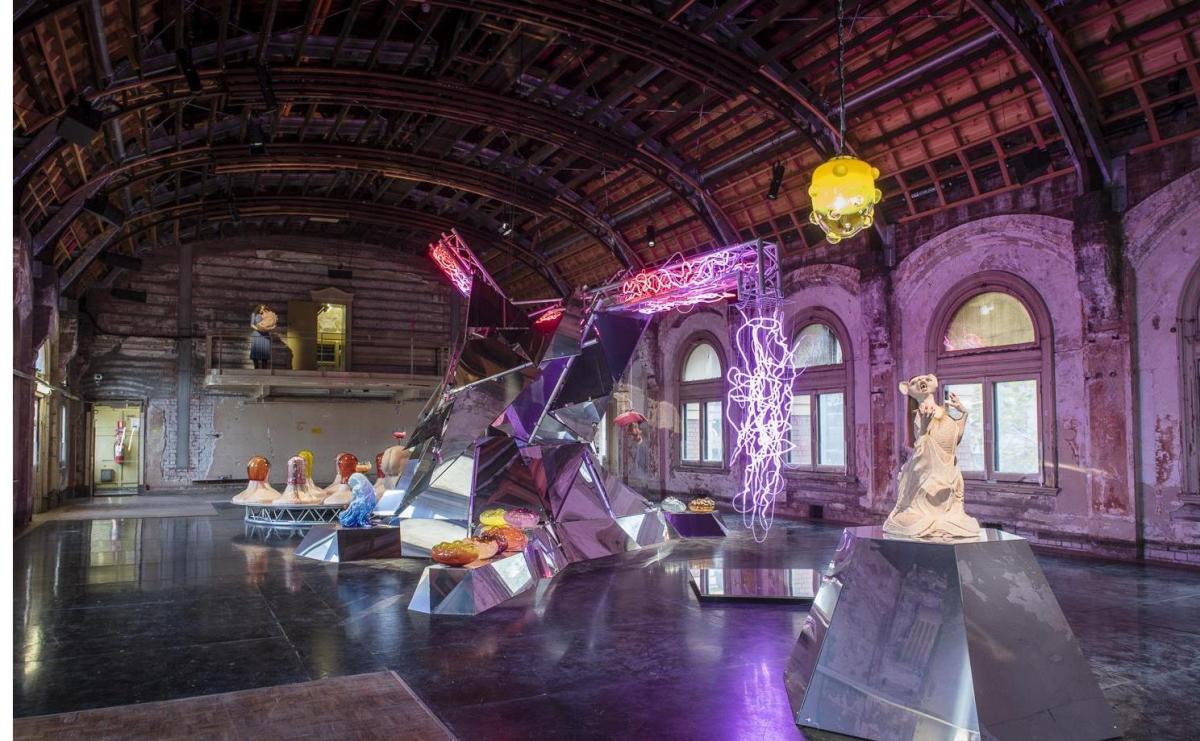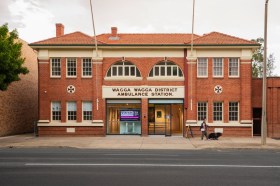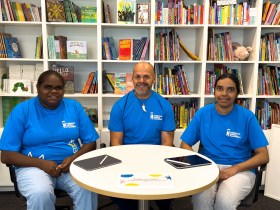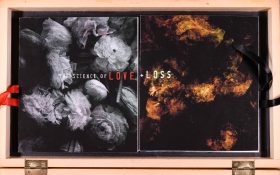Once a central hub of Melbourne where many of the city’s cultural events took place, the third floor of Flinders Street Station – the domain of the Victorian Railway Institute, including a library, gym and ballroom – has sat unused and in disrepair for decades, hidden from the public eye and largely forgotten.
Its grand decaying interior of peeling paint and rusted pressed metal surfaces create the perfect dystopian environment for A Miracle Constantly Repeated, the latest Patricia Piccinini exhibition showing as part of Melbourne’s new winter arts festival, Rising. Open for the first time in 35 years, these spaces have been repurposed for the solo exhibition and will be accessible to the public.
Originally slated to take place in August 2020, the festival was pushed back to May this year because of the Coronavirus pandemic. Directed by Hannah Fox and Gideon Obarzanek, it commenced on the evening of the total lunar eclipse last week but soon had to be postponed due to a new COVID outbreak in Melbourne. At the time of publication, the festival’s final three days (Friday 4 June – Sunday 6 June) have also been cancelled.
A Miracle Constantly Repeated is Piccinini’s first solo Melbourne show in nearly 20 years. She works across a range of mediums from sculpture and installation to film, creating strange, unsettling creatures and environments in which hybrid beings, like those in H.G. Well’s science fiction novel The Island of Doctor Moreau, populate the spaces.
And, like Wells, Piccinini explores a number of philosophical themes including human identity and human interference with nature. Ethics, compassion and relationships are at the core of the artist’s work. Challenging her audience in this way has resulted in an exhibition that is both clever and curious and requires more than a passive viewing.
An integral element of this exhibition is its curatorial approach; the choice to provide no supporting interpretive material allows the viewer to interact with the art and the spaces they inhabit on an experiential, emotive and intuitive level.
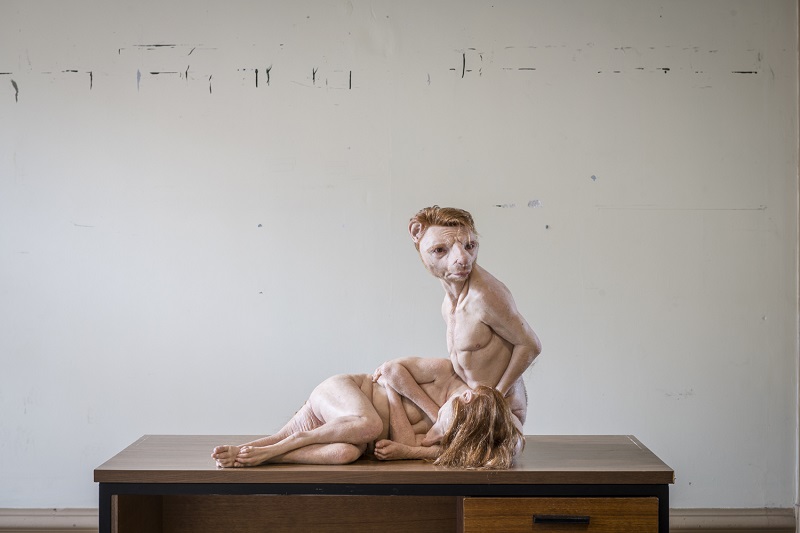
Photo credit: Eugene Hyland.
Spread across many rooms of varying sizes, on entering the first space, the viewer is presented with a diorama – a forest in which strange creatures emerge from the foliage. Using latex and silicon, Piccinini creates life-like human-cum-animal beings; a possible outcome perhaps of man’s interference with nature through technological advances and experimentation.
In another room two life-like children cradle a laundry basket with an injured koala, rescued maybe from the bushfires that raged through our continent in the recent past. They are alone in the space, a mix of compassion and concern etched across their young faces. Is this to be their future?
Piccinini also makes use of old furniture left or discarded when these rooms were vacated many years before – a desk or filing cabinet are repurposed to become a plinth for art pieces; the present making the most of the past’s legacy.
Piccinini builds on this notion of civilisation as we know it destroyed or changed in one of her installation spaces; a feeling of being the voyeur may unsettle some viewers as they step into what appears to be someone’s private living space.
A hybrid couple snuggle together in a bed surrounded by an eclectic mix of furniture, strange/found objects and old technology in disrepair. Is this a snapshot of our future destroyed by past ignorance and neglect?
Ethics, compassion and relationships are at the core of the artist’s work.
The finale of the exhibition is the huge ballroom at the end of the long hallway. It is the exhibition’s arterial from which all other rooms stem. At the room’s centre is the installation, Mother Tree – part crane, part shattered mirror glass and neon lights, along-side rest invitro bubbles of glass ready to birth a new kind of life. The neon lights and soundtrack making this a strange slightly eerie multi-sensory experience.
Finally realised after two years of negotiations between festival organisers Fox and Obarzanek, and the multiple stakeholders involved to use the ballroom and surrounding spaces above Flinders Street Station, these protracted conversations act as a kind of metaphor for another conversation – a much bigger one between the artworks, the environment they inhabit and humanity itself.
Are we headed for a dystopian future if we continue along our present trajectory of global warming and unfettered technological advancement or is there perhaps a new way of being, of adapting on a changed planet?
Promoted as a festival accessible to people with a diverse range of needs from mobility to vision and hearing, A Miracle Constantly Repeated can be accessed via lift or stairs; its labyrinth of rooms are also wheel-chair accessible.
4 out of 5 stars: ★★★★
A Miracle Constantly Repeated: Patricia Piccinini
Venue: 3rd floor Flinders Street Station (Cnr Flinders St & Swanston St., Melbourne
Presented as part of RISING
Revised opening times due to Covid restrictions (subject to change)
Opening times: 10am – 8am daily from Tuesday 15 June (bookings required)
Tickets: $32 – $36 + booking fee, persons under 12 free
Closed public holidays
